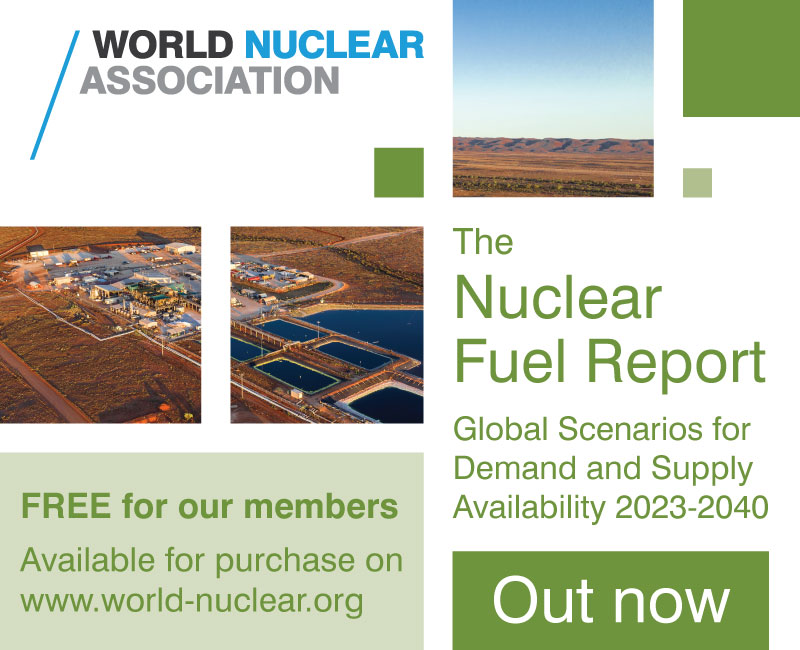White House report highlights nuclear achievements
-48.jpg) On the same day the US Senate passed a bill to accelerate the development of advanced nuclear reactors, the White House Office of Science and Technology Policy highlighted nuclear energy developments as the greatest achievements of the Trump administration to date in the area of energy dominance.
On the same day the US Senate passed a bill to accelerate the development of advanced nuclear reactors, the White House Office of Science and Technology Policy highlighted nuclear energy developments as the greatest achievements of the Trump administration to date in the area of energy dominance. On the same day the US Senate passed a bill to accelerate the development of advanced nuclear reactors, the White House Office of Science and Technology Policy (OSTP) highlighted nuclear energy developments as the greatest achievements of the Trump administration to date in the area of energy dominance.
-460.jpg) |
| Energy Secretary Rick Perry applauds President Trump at the Unleashing American Energy event in June 2017 (Image: Simon Edelman/DOE) |
The OSTP advises the US President on science and technology, supports the President's agenda, and ensures the effective coordination of science and technology efforts across the US Executive Branch. Topics on which OSTP currently advises developing policies include: advanced manufacturing, artificial intelligence, autonomous systems, biotechnology, cybersecurity, digital economy, disaster preparedness, healthcare, infectious diseases, information technology, medicine, nanotechnology, nuclear energy, ocean science, quantum information sciences, space and aeronautics, and telecommunications.
In Science and Technology Highlights in the First Year of the Trump Administration, published on 7 March, the OSTP said it had over the past year led "coordinated Administration efforts to promote emerging technologies, empower Americans to innovate, and defend American technologies abroad". It said the administration's request for USD151.2 billion for federal R&D investment in the 2018 budget - a 2% increase on 2016 - demonstrated Trump's commitment to the importance of federal scientific investigation.
The report highlights three achievements in its section on Energy Dominance - all connected to nuclear innovation. These are: the "complete review" of US nuclear energy policy called for by Trump during the Unleashing American Energy event in June; the 13 November announcement by Energy Secretary Rick Perry that contractors to US national laboratories may use Agreements for Commercialising Technology to facilitate new strategic partnerships with national laboratories; and the resumption of domestic nuclear testing facilities at the Idaho National Laboratory's Transient Reactor Test Facility (TREAT). The facility, which is used to test nuclear fuels and materials under extreme conditions, had not operated since being shut down in 1994.
Bipartisan support for advanced reactors
The Nuclear Energy Innovation Capabilities Act (NEICA) was passed by the US Senate on the same day that the OSTP published its report. The bipartisan legislation would facilitate public-private partnerships between private-sector nuclear energy innovators and government researchers to develop advanced nuclear reactors. The act would open the research capabilities of the DOE's national laboratories to private companies, allowing the testing and demonstration of privately funded reactor concepts.
The act authorises the development of a versatile reactor-based source of fast neutrons needed to test advanced reactors, fuels and related materials. It also authorises the creation of a National Reactor Innovation Center to enable the construction of experimental reactors and provides for the sharing of technical information and expertise between the DOE and the US Nuclear Regulatory Commission, which could help to accelerate NRC licensing of advanced designs.
Nuclear Energy Institute president and CEO Maria Korsnick said the bill's passage in the Senate was a "welcome and timely reminder" of the bipartisan support for innovative technologies in the US Congress. "Its provisions, once enacted into law, will go a long way to ensure the United States remains at the forefront of civilian nuclear capability," she said.
The measure will now be sent for consideration to the House of Representatives.
Researched and written
by World Nuclear News


.jpg)










